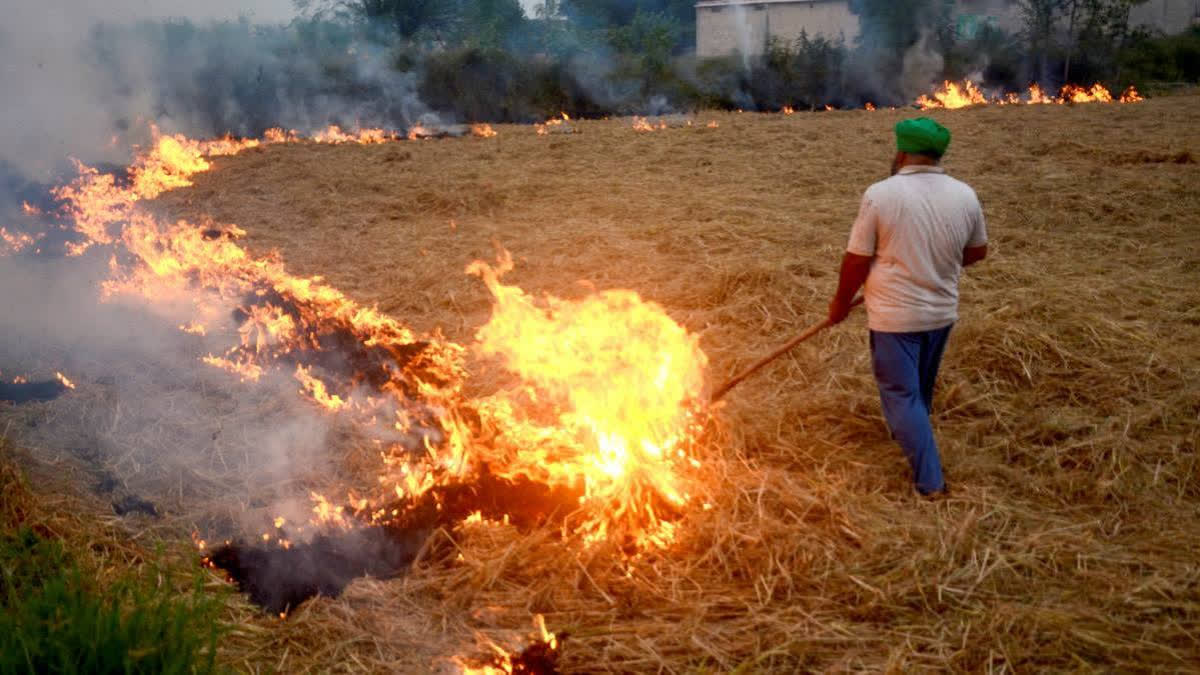New Delhi: Ahead of the onset of winter, a debate rages in Delhi and the National Capital Region (NCR) about deteriorating air quality levels. Stubble burning by farmers in the neighbouring states of Punjab, Haryana and Uttar Pradesh and Diwali, the Hindu festival of lights during which people burst firecrackers, are cited as the main reasons for this.
Though Diwali is a one-day festival, the run-up and the after-festivities last for a few days. However, it is the stubble burning in the neighbouring states from autumn onwards that is cited as the main reason for air pollution in Delhi-NCR. But this problem is not restricted to Delhi-NCR alone. It spreads to neighbouring Pakistan as well.
So much so that Chief Minister of Pakistan’s Punjab province Maryam Nawaz Sharif has called for collaboration with India’s Punjab state to fight the "common enemy" of smog.
"Smog is not a political matter but a human challenge," Dawn.com quoted Maryam as saying while addressing a Diwali event in Lahore, the capital of Pakistan's Punjab province, on Wednesday. "I have previously called for climate diplomacy with India, and I am considering writing to the Chief Minister of Indian Punjab, Bhagwant Mann, to seek joint efforts to combat smog."
But the fact of the matter is that stubble burning is not a problem of India alone. It is a problem within Pakistan as well. This agricultural practice, primarily to clear fields for the next crop season, releases large quantities of pollutants into the air that travel across borders and severely impact air quality and health in neighbouring areas.
Stubble burning is seen as a cost-effective and time-efficient method for land clearance. Despite government restrictions, the lack of affordable alternatives, coupled with a narrow planting window, compels many farmers to continue the practice.
According to Hina Shaikh, Senior Country Economist, Pakistan, at the International Growth Centre (IGC), many farmers in Pakistan like their counterparts in northern India, consider stubble burning as the most effective and cost-efficient way to clear land for the next planting season.
"Despite the risks and safety concerns, burning of crop residue is an extremely common and widely acceptable practice in Pakistan especially in the rice-wheat belt of the country," Shaikh writes in an article headlined 'Stubble burning in Pakistan: Why it continues and how can it be curtailed’ on the IGC website.
"Agriculture accounts for a fifth of Pakistan's GDP and is largely concentrated in the Punjab province. Between October and January every year, out of 8.5 million tonnes of rice residue produced, at least 3.6 to 5 million tonnes are burnt to clear the fields for sowing wheat. Burning stubble remains the fastest and most affordable way to prepare fields for subsequent planting seasons."
Shaikh writes that, around this time, Punjab witnesses a significant deterioration in air quality, while Pakistan’s largest urban centres, Lahore and Karachi, already rank amongst the most polluted cities of the world.
"The sharp increase in air pollution is caused by crop burning fires along with thermal inversion - a meteorological phenomenon in which particulate matter and other pollutants trapped in air, mix with condensed water vapour to form smog," she states.
The northwest-southeast wind patterns in the Indian subcontinent play a significant role in transporting pollutants from Indian Punjab to Pakistan. During the late autumn and early winter seasons, the prevailing winds often carry smoke and pollutants from the stubble-burning zones in Indian Punjab across the border into Pakistan’s Punjab province, including cities like Lahore, Faisalabad, and Gujranwala.
The relatively flat topography of the Punjab plains allows the easy movement of airborne pollutants across borders. There are few natural barriers that could slow or block this transboundary drift, allowing pollution to spread over large areas quickly.
During her address at the Diwali event, Maryam said that both India and Pakistan must unite to effectively address the smog crisis, as "winds do not recognise borders".
"Unless both Punjabs unite, we will not be able to effectively combat smog," she said.
According to the Dawn.com report, the Lahore city administration had previously warned that polluted air from Amritsar, New Delhi and Chandigarh was moving towards Lahore at a speed of 7 km per hour, contributing to the city's worsening smog problem. Maryam’s comments come after she had earlier called for "climate diplomacy" between India and Pakistan.
"We should talk to them, this is called climate diplomacy. We should do it with India," she had said earlier this month ahead of External Affairs Minister S Jaishankar’s visit to Islamabad to attend the Shanghai Cooperation Organisation (SCO) Heads of Government meeting.
Relations between India and Pakistan have been in deep freeze since the terror attack on an Indian Army camp at Uri in Jammu and Kashmir in September 2016. The relations were further downgraded following New Delhi's revocation of Article 370 in Jammu and Kashmir in 2019.
However, there have been speculations in recent times about the renewal of ties between the two South Asian nuclear-armed neighbours in view of Jaishankar’s visit this month, the first by an Indian minister in nearly a decade, and Pakistan being made the host of the 2025 Champions Trophy cricket tournament.
When winter sets in, Delhi in India and Lahore in Pakistan rank among the worst polluted cities in the world. Maryam’s renewed call for talks between Indian Punjab and Pakistani Punjab can be seen as another factor fuelling such speculations.
Will paradiplomacy, the international activities carried out by subnational entities such as states, provinces, regions, or cities that are not officially recognised as sovereign states in their own right, come into the India-Pakistan bilateral relationship framework?
Watch this space.



